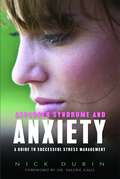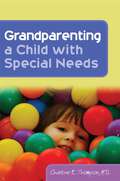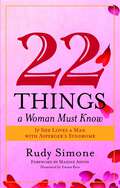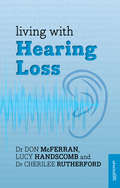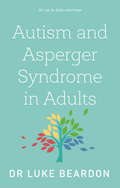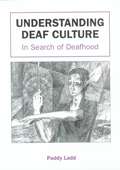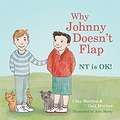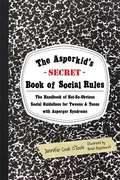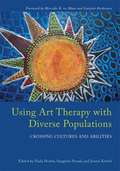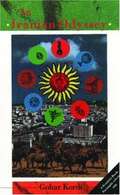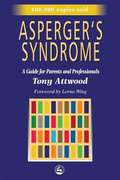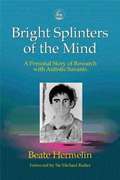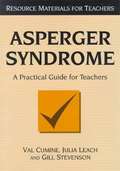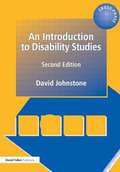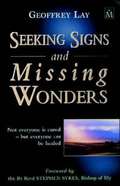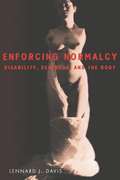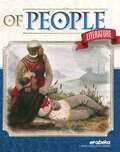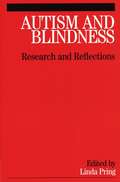- Table View
- List View
Asperger Syndrome and Anxiety: A Guide to Successful Stress Management
by Nick DubinMany people suffer from feelings of stress and anxiety in their everyday lives. For people with Asperger Syndrome (AS), this stress can be particularly difficult to manage. On a daily basis people with AS must fit into a world that seems totally foreign to them and this can increase feelings of alienation and anxiety, making life's challenges especially hard to cope with. The first book on anxiety written specifically for adults with Asperger Syndrome, this book offers practical advice on how individuals with AS can manage their anxiety more effectively. As a person with AS who has struggled with feelings of anxiety and learnt how to overcome them, Nick Dubin shares his own tried and tested solutions along with up-to-date research on stress management for individuals with AS, including a chapter on Cognitive Behavioural Therapy (CBT). Dubin explores the key problem areas that can lead to anxiety for people with AS such as lack of social skills, difficulties establishing romantic relationships and uncertainty about employment. Asperger Syndrome and Anxiety provides real solutions to a common problem and is essential reading for anyone with AS who has trouble managing stress. The book will also be of interest to family members, teachers and other professionals working with individuals with AS.
Asperger Syndrome and Anxiety: A Guide to Successful Stress Management
by Nick DubinMany people suffer from feelings of stress and anxiety in their everyday lives. For people with Asperger Syndrome (AS), this stress can be particularly difficult to manage. On a daily basis people with AS must fit into a world that seems totally foreign to them and this can increase feelings of alienation and anxiety, making life's challenges especially hard to cope with. The first book on anxiety written specifically for adults with Asperger Syndrome, this book offers practical advice on how individuals with AS can manage their anxiety more effectively. As a person with AS who has struggled with feelings of anxiety and learnt how to overcome them, Nick Dubin shares his own tried and tested solutions along with up-to-date research on stress management for individuals with AS, including a chapter on Cognitive Behavioural Therapy (CBT). Dubin explores the key problem areas that can lead to anxiety for people with AS such as lack of social skills, difficulties establishing romantic relationships and uncertainty about employment. Asperger Syndrome and Anxiety provides real solutions to a common problem and is essential reading for anyone with AS who has trouble managing stress. The book will also be of interest to family members, teachers and other professionals working with individuals with AS.
Grandparenting a Child with Special Needs
by Charlotte ThompsonWhen a new baby is born into a family, grandparents are excited about having a baby to enjoy and love. If the child is born with a disability, it can be difficult to know how to react and how best to help the child and the family as a whole. This book provides guidance on how to grandparent a child with special needs and give every grandchild the love and care they deserve and parents the added support they need. From coming to terms with a diagnosis, to helping with the transition from adolescence to adulthood, the book gives clear advice on grandparenting a child with special needs throughout their life. The author covers the medical, emotional and practical aspects of being a grandparent and explores important issues such as researching resources for specialized care, accessing financial and legal resources and, just as importantly, how to have fun and spend quality time with a grandchild with a disability. The book also addresses how to handle the diagnosis of a serious accident or progressive illness. Grandparenting a Child with Special Needs is a unique guide for grandparents keen to make a difference to the lives of their children and their grandchildren.
22 Things a Woman Must Know If She Loves a Man with Asperger's Syndrome
by Rudy Simone Maxine AstonAlthough having Asperger Syndrome (AS) can make romantic relations difficult, having a fulfilling relationship with an Asperger man is certainly not impossible. A woman in love with a man with AS may interpret his difficulties with communication and socialization as a lack of interest in the relationship. He may vacillate between being gentle and caring to seeming cold and distant. She may find his behaviour hard to understand, resulting in feelings of loneliness, isolation, and confusion. This book shows how to overcome these difficulties and maintain a loving relationship with an AS partner. From an unwillingness to show affection in public or even sleep in the same bed to problems holding down a job, this book looks at 22 common traits that women may discover when they are dating, living with or married to a man with Asperger's Syndrome. Rudy Simone explores the complications of Asperger's relationships with honesty and understanding, drawing on research and personal experience to inform and advise women with AS partners. She offers helpful tips for improving the relationship and finding fulfillment both individually and as a couple. This book will help women to understand the male Asperger's mind and, equally, it can help men with AS to see things from their partner's perspective. It will also be of interest to counsellors working with couples where the male partner has Asperger's Syndrome.
Living with Hearing Loss
by Don McFerranAn up-to-date, comprehensive book on how to manage hearing loss, by three experienced audiologists.
Living with Hearing Loss
by Don McFerranAn up-to-date, comprehensive book on how to manage hearing loss, by three experienced audiologists.
Autism and Asperger Syndrome in Adults
by Luke BeardonEstimated to affect just over 1 per cent of the adult population in the UK - some 700,000 individuals ? autism is still persistently viewed as a disorder or impairment ? but, this concept needs to be challenged. Written by a university lecturer with several years? experience in the field, this book presents an up-to-date overview of autism and Asperger syndrome, and comments on the realities of adult life including further and higher education, employment, dating and parenthood. For autistic children, teenagers and adults, their families and friends, and any professionals interested in autism. Topics include:Terminology and what?s preferredCommon myths and stereotypesDiagnosis and related issuesTips for undiagnosed adults Understanding how autism impacts on the individualSensory issuesTransition into adulthoodFriendships and intimate relationshipsThe Criminal Justice System - what happens when autistic people break the lawIn this sensitive and insightful book, Dr Luke Beardon asserts that there are many hugely intelligent, empathic, kind, caring, loyal and skilled autistic individuals ? so it?s time to treat them as such and respect their differences.
Autism and Asperger Syndrome in Adults
by Luke Beardon'Luke has years of valuable experience, and is always thinking and learning about autism' - Professor Nicola MartinHave you recently been diagnosed as autistic?Do you suspect you might be autistic?If you've recently been diagnosed as autistic, think you may be or are close to someone who is, one of the things you will like most about this book is the way in which it challenges the idea of autism as a 'disorder' or 'impairment'.Instead, Dr Luke Beardon will help you to reframe what you feel, and challenge what you know, about being on the spectrum. He explains how autism impacts on the individual, and what purpose a diagnosis might - or might not - serve. There is a lot of myth-busting, and dismantling of the stereotypes and clichés around ASD and areas like communication, social interaction and relationships. Practical tips for undiagnosed adults will help you navigate things like school, work, study, parenthood and even to understand what happens when autistic people break the law.Above all, this book is a celebration of what it means to be autistic - of the passion, honesty, humour, lack of ego, loyalty and trustworthiness that make you, or your loved one, such an amazing person.
Understanding Deaf Culture
by Paddy LaddThis book presents a 'Traveller's Guide' to Deaf Culture, starting from the premise that Deaf cultures have an important contribution to make to other academic disciplines, and human lives in general. Within and outside Deaf communities, there is a need for an account of the new concept of Deaf culture, which enables readers to assess its place alongside work on other minority cultures and multilingual discourses. The book aims to assess the concepts of culture, on their own terms and in their many guises and to apply these to Deaf communities. The author illustrates the pitfalls which have been created for those communities by the medical concept of 'deafness' and contrasts this with his new concept of "Deafhood", a process by which every Deaf child, family and adult implicitly explains their existence in the world to themselves and each other.
Why Johnny Doesn't Flap: NT Is Ok!
by Clay Morton & Gail MortonJohnny is different. He is never exactly on time, he can't seem to stick to a routine and he often speaks in cryptic idioms. Johnny is neurotypical, but that's OK. A picture book with a difference, Why Johnny Doesn't Flap turns the tables on common depictions of neurological difference by drolly revealing how people who are not on the autistic spectrum are perceived by those who are. The autistic narrator's bafflement at his neurotypical friend's quirks shows that 'normal' is simply a matter of perspective.
The Asperkid's (Secret) Book of Social Rules: The Handbook of Not-So-Obvious Social Guidelines for Tweens and Teens with Asperger Syndrome
by Jennifer Cook O'TooleThis book is meant for asperkids and offers insights into baffling social codes such as making and keeping friends, blending in versus standing out from the crowd, and common conversation pitfalls, provides inside information on over thirty social rules in bite-sized chunks that older children can enjoy and understand.
Using Art Therapy With Diverse Populations: Crossing Cultures and Abilities
by Paula Howie Sangeeta Prasad Jennie Kristel Mercedes B. Ter Maat Gaelynn P. Wolf BordonaroArt is a recognised and effective form of therapy that is used all over the world. Yet are the approaches used as universal as the successes? Written with an international focus, this book considers how culture impacts the practice of art therapy in a variety of settings. With contributions from experienced art therapists who have worked in diverse environments, this book attempts to understand and highlight the specific cultural, subcultural and ethnic factors that inform art therapy treatment. It addresses variable factors including setting, population, environment and ability, and how they influence art therapy approaches. It also considers how cultural differences can impact physical art making through choices of color, symbol and metaphor. Each chapter provides a framework showing how art therapy techniques have been used in order to successfully work with distinct populations. This book will provide practitioners with ideas for how to adapt art therapy training and approaches to suit the setting and meet the needs of a huge range of populations. Full of informative case studies, this book will be invaluable reading for art therapists and students of art therapy.
An Iranian Odyssey
by Gohar KordiFrom the Book Jacket: Gohar Kordi was born in a small Kurdish village in Iran. At the age of four, she became blind. She writes of her growing up in the country, the family's move to Tehran and her personal struggle to get an education and become the first woman student at the university. Compelling, with a quiet, hypnotic power, An Iranian Odyssey is an autobiography that reveals its belief that adversity can be overcome.
Guiding Stars: The Guide Dogs for the Blind Association
by Peter IresonA selection of writings, recollections and images chosen to convey some of the joys and anxieties, achievements and disappointments experienced by the generations of people who have either used guide dogs or helped to provide them.
Harnessing Thought
by Bruce JohnsonThis book tries to give a psychological insight into the skillful and thoughtful mind of the guide dog. How does the young dog acquire the knowledge and skills to be a safe, fluent and confident guide? Is the dog capable of taking conscious decisions about alternative courses of action, predicting what is likely to happen next in a particular situation and of remembering how to respond to a wide variety of objects, people and events? These are questions that take us to the very forefront of our understanding of animal learning, consciousness and thought.
Running with Walker: A Memoir
by Robert J. HughesWhen Walker Hughes is two years old, a neurologist tells his parents that he has autism and concludes, "I have very little hope for this child." Walker's parents refuse to accept this grim prognosis. With boundless energy and breathtaking creativity they set about to enhance his skills and enrich his life. There is no miracle cure, no magic key that unlocks the door to Walker's inner world. Hughes vividly describes his son's severe disability and at the same time portrays him as an exuberant, loving, and utterly unique individual.
Asperger's Syndrome: A Guide for Parents and Professionals
by Tony AttwoodA book designed for parents and teachers alike on Asperger's Syndrome. The information in this book is also applicable to individuals who are labeled as high functioning Autism. An excelent resource for anyone who works with an individual with a disorder on the autism spectrum.
Bright Splinters of the Mind: A Personal story of research with Autistic Savants
by Beate HermelinThe author describes a series of studies which she and her colleagues have conducted in an attempt to gain a deeper understanding of autistic savant syndrome. Her subjects include children and adults with autism who have remarkable abilities in music, art, mathematics, foreign languages, and calendar calculation. Hermelin suggests that people with autism perceive detail before recognizing an integrated whole. This is a very readable book with a strong scholarly foundation.
Asperger Syndrome: a Practical Guide for Teachers
by Val Cumine Julia Leach Gill StevensonFrom the book Jacket: This is a clear and concise guide to effective classroom practice for teachers and support assistants working with children with Asperger Syndrome in mainstream schools and other non-specialist settings. The authors ? outline the underlying impairments and their educational implications ? consider the issues of assessment and diagnosis ? offer practical strategies for effective and realistic classroom intervention, including access to the National Curriculum ? consider the behavioural challenges the child with Asperger Syndrome may pose. The book seeks to inform professionals meeting a child with Asperger Syndrome for the first time and to equip them with effective educational and behavioural intervention strategies. Professionals in special schools, INSET providers, educational psychologists, parents and carers will all find this book helpful. Val Cumine, Specialist Senior Educational Psychologist for Lancashire Educational Psychology Service, Ormskirk; Julia Leach, Educational Psychologist for Lancashire Educational Psychology Service, Burnley; and Gill Stevenson, Teacher at Pendle Tutorial Centre, Lancashire.
Introduction to Disability Studies
by David JohnstoneAn introductory text that explores the current issues in the lives and circumstances of disabled people, their careers, and those who intend to work in the caring services. Explores and analyzes quality of life factors, the emergence of rights, and the strengths and weakness of community care provisions. Also provides examples of individual oppressions and success stories, and suggests how disabled and non-disabled people can collaborate in the development of inclusive communities and neighborhoods. Distributed by Taylor & Francis. Annotation c. by Book News, Inc., Portland, OR.
Seeking Signs and Missing Wonders
by Geoffrey LayJeoffrey Lay went blind, through a genetic defect, in his late twenties, and his wife Christine lost a daughter at the age of five months from serious cerebral palsy and other disabilities. Geoff is not only a Christian but a parish priest with a healing ministry.
Higher Education and Disabilities: International Approaches
by Alan HurstThe subject of disabled students in universities has been overlooked in educational research. Building on the content of his first book "steps towards graduation" Alan Hurst has worked with colleagues from overseas to compile a collection of papers which explore aspects of policy and provision for this important student minority. The book contains accounts from Australia and North America as well as countries at different stages of policy development in Europe. The book should be of interest to staff working with students with disabilities in post-compulsory education since it describes strategies for developing policy, which could be transferable to other contexts. The book will be especially useful for those involved in promoting opportunities for study abroad. It will also be relevant to those engaged in researches in special education, comparative education and educational policy as well as in the growing area of disability studies.
Enforcing Normalcy: Disability, Deafness, and the Body
by Lennard J. DavisThis book tries to think through some of the complex issues raised by concepts such as the body, the normal, the abnormal, disability, the disabled, and people with disabilities. I wrote this book because I believe deeply that people with disabilities, Deaf people, and others who might not even consider themselves as having a disability have been relegated to the margins by the very people who have celebrated and championed the emergence of multiculturalism, class consciousness, feminism, and queer studies from the margins.
Instrumental Music for Dyslexics: A Teaching Handbook
by Sheila OglethorpeInstrumental Music for Dyslexics is written mainly for music teachers. It describes dyslexia in layman's terms and explains how the various problems which a dyslexic may have can affect all aspects of learning to play a musical instrument. It alerts the music teacher with a problem pupil to the possibilities of that pupil's having some form of dyslexia. Although Sheila Oglethorpe is primarily a piano teacher the general principle behind most, if not all, the suggestions is such that they can be adapted for use by other instrumentalists. The book presents ways in which the music teacher can contribute to the self esteem and thereby the general welfare of the dyslexic pupil who is often musically gifted and has much to offer. The book will also be of interest to dyslexia specialists who have hitherto directed their concentration towards the language-based problems of the dyslexic.
Autism and Blindness: Research and Reflections
by Linda PringThis book has brought together leading international experts to explore the similarities and the differences between autism and blindness. Current research with children as well as adults is described comparing early psychological development from a range of perspectives such as language, memory, thought and feelings as well as providing critical reviews of educational and intervention programmes. New developments in the field have sparked debate that is well represented here and touches on a variety of issues ranging from musical talent to the basis of 'connectedness' to others. The readership will be drawn from many fields reflecting the interdisciplinary nature of the topic and will include researchers and practitioners in psychology and psychiatry as well as educationalists, therapists, classroom teachers and parents.
